Say this for Gegege no Kitarou: it’s not always great but when it is, it doesn’t mess around.
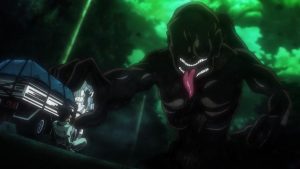 After more than a year’s worth of episodes, the overall pattern of Gegege no Kitarou 2018 is pretty easy to discern. It’s consistently good, with the occasional indifferent episode (usually when it skews very young). But every so often you get a genuine masterpiece of an episode. They don’t happen all that often, but you sure remember when they do, and they act as sort of mile markers for the series. I’d say there have been about a dozen of them so far, maybe less, and if you do the math that’s one every five or six weeks. But it sure seemed like a while since we had the last one.
After more than a year’s worth of episodes, the overall pattern of Gegege no Kitarou 2018 is pretty easy to discern. It’s consistently good, with the occasional indifferent episode (usually when it skews very young). But every so often you get a genuine masterpiece of an episode. They don’t happen all that often, but you sure remember when they do, and they act as sort of mile markers for the series. I’d say there have been about a dozen of them so far, maybe less, and if you do the math that’s one every five or six weeks. But it sure seemed like a while since we had the last one.
 While some of the “canon” episodes where Nanashi featured were pretty great, most of the tentpole eps have been stand-alone stories, and this week’s was one of them. Of all the various threads running through the Gegege no Kitarou mythology the precarious position Kitarou occupies, perched uncomfortably between the human and youkai worlds, is probably the most compelling. Kitarou is not a human, but his emotions have a way of seeming very human and very alien at the same time. He looks like a child in our terms, but in our terms he’s no child. And just because he does what he has to do, that doesn’t mean it doesn’t torture him inside.
While some of the “canon” episodes where Nanashi featured were pretty great, most of the tentpole eps have been stand-alone stories, and this week’s was one of them. Of all the various threads running through the Gegege no Kitarou mythology the precarious position Kitarou occupies, perched uncomfortably between the human and youkai worlds, is probably the most compelling. Kitarou is not a human, but his emotions have a way of seeming very human and very alien at the same time. He looks like a child in our terms, but in our terms he’s no child. And just because he does what he has to do, that doesn’t mean it doesn’t torture him inside.
 The Doratobo (Tani Atsuki) is an important figure in the GGGnK lexicon. It was the focus of the premiere of the 1971 series, the plot of which was referenced in this episode – Doratobo was angry over the construction of a golf course and threatened all the humans in the area. That episode ended very differently than this one, though whether that reflects a darker overall tone in this series is not for me to say. It was a product of its time, and this episode a product of its time – and also very representative of the moral ambiguity that’s a common feature in this series’ best stories.
The Doratobo (Tani Atsuki) is an important figure in the GGGnK lexicon. It was the focus of the premiere of the 1971 series, the plot of which was referenced in this episode – Doratobo was angry over the construction of a golf course and threatened all the humans in the area. That episode ended very differently than this one, though whether that reflects a darker overall tone in this series is not for me to say. It was a product of its time, and this episode a product of its time – and also very representative of the moral ambiguity that’s a common feature in this series’ best stories.
 Connecting that long ago story to this one is not just the Doratobo, but Kurose (Yamaji Kazuhiro, who really is a wonderful actor). He was a child present for the events of the earlier story, and we’re shown that his father died of injuries he suffered at the Doratobo’s hands. Now he’s back, his own small son Daiki (Takahashi Karin – interestingly, none of this week’s three main guest seiyuu have appeared in earlier versions of the series) in tow, in charge of a new construction project. This time around it’s a solar power station, but the Doratobo isn’t fussed about human politics – he’s of a one-track mind if anyone ever was.
Connecting that long ago story to this one is not just the Doratobo, but Kurose (Yamaji Kazuhiro, who really is a wonderful actor). He was a child present for the events of the earlier story, and we’re shown that his father died of injuries he suffered at the Doratobo’s hands. Now he’s back, his own small son Daiki (Takahashi Karin – interestingly, none of this week’s three main guest seiyuu have appeared in earlier versions of the series) in tow, in charge of a new construction project. This time around it’s a solar power station, but the Doratobo isn’t fussed about human politics – he’s of a one-track mind if anyone ever was.
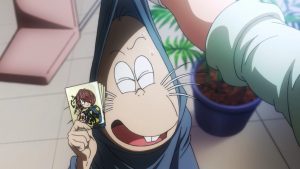 It would be easy to imagine this as a very black-and-white tale – Kurose out for revenge for his father’s death, human encroachment against nature. But this is no golf course, but a clean energy project pitched as a last-ditch effort to save a dying town (which Japan is full of). And Kurose is grateful for what Kitarou did all those years ago, even if he’s too proud to say it. No, this is pitched as something more elemental and difficult – the innate human desire to dig and build, dig and build, to make something for the new generation. And standing against it, an ageless youkai whose very existence is tied to the land the humans are trying to take as their own.
It would be easy to imagine this as a very black-and-white tale – Kurose out for revenge for his father’s death, human encroachment against nature. But this is no golf course, but a clean energy project pitched as a last-ditch effort to save a dying town (which Japan is full of). And Kurose is grateful for what Kitarou did all those years ago, even if he’s too proud to say it. No, this is pitched as something more elemental and difficult – the innate human desire to dig and build, dig and build, to make something for the new generation. And standing against it, an ageless youkai whose very existence is tied to the land the humans are trying to take as their own.
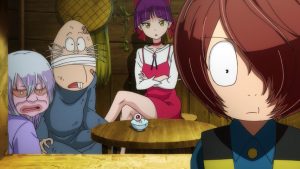 Caught in the middle, as ever, is Kitarou. He’s too conscientious to sit by and let tragedy happen, but it’s clear his sympathies lie with the Doratobo. And I think he knows how this is all likely to end if he gets involved. As stubborn as Kurose is the Doratobo is his match – “Return my fields!” is the only thing he cares to say. Despite the fact that his own father regretted dying rather than running away, Kurose himself refuses to back down. Say what you will about his belief in humanity’s destiny being bigger than he is – he’s leaving his son behind if he dies here (just as his father did) and seems all too willing to ignore that fact.
Caught in the middle, as ever, is Kitarou. He’s too conscientious to sit by and let tragedy happen, but it’s clear his sympathies lie with the Doratobo. And I think he knows how this is all likely to end if he gets involved. As stubborn as Kurose is the Doratobo is his match – “Return my fields!” is the only thing he cares to say. Despite the fact that his own father regretted dying rather than running away, Kurose himself refuses to back down. Say what you will about his belief in humanity’s destiny being bigger than he is – he’s leaving his son behind if he dies here (just as his father did) and seems all too willing to ignore that fact.
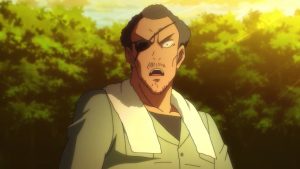 Without question, it’s Kurose’s pride that forces Kitarou to do something that makes him hate himself (again). Would he have used his finger guns on Kurose if Daiki hadn’t shown up? I tend to think not, but I’m not so sure he would have “exploded” (that ability is unfamiliar to me) if Daiki hadn’t been there to protect. Pity Kitarou – because he’s chosen the life of a broker of peace, so often he has to be the one to do the terrible thing no one else can (or will) do. And so often that means acting against his own kind on the behalf of humans who’ve forced his hand with their own poor judgment and short-sightedness. If there’s any one thing that’s at the heart of this series, when you strip all the rest of it away, I think that tragic reality is it. And when the series focuses on it, it makes absolutely riveting viewing.
Without question, it’s Kurose’s pride that forces Kitarou to do something that makes him hate himself (again). Would he have used his finger guns on Kurose if Daiki hadn’t shown up? I tend to think not, but I’m not so sure he would have “exploded” (that ability is unfamiliar to me) if Daiki hadn’t been there to protect. Pity Kitarou – because he’s chosen the life of a broker of peace, so often he has to be the one to do the terrible thing no one else can (or will) do. And so often that means acting against his own kind on the behalf of humans who’ve forced his hand with their own poor judgment and short-sightedness. If there’s any one thing that’s at the heart of this series, when you strip all the rest of it away, I think that tragic reality is it. And when the series focuses on it, it makes absolutely riveting viewing.



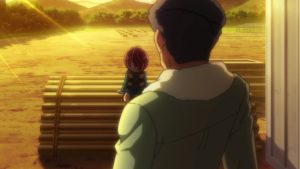
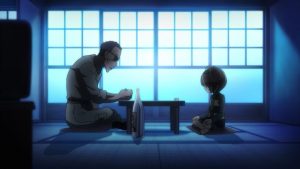

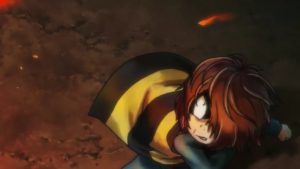
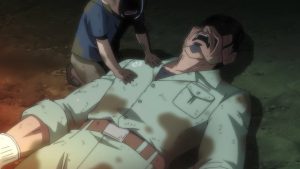
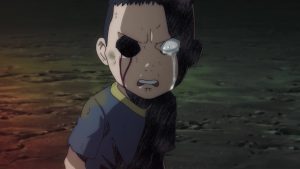
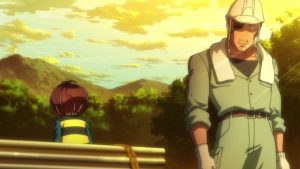
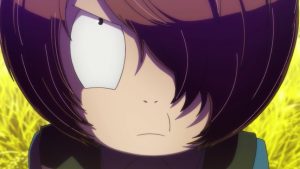
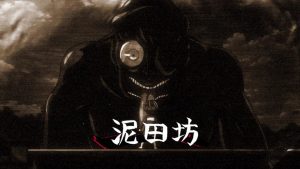

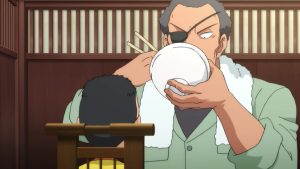

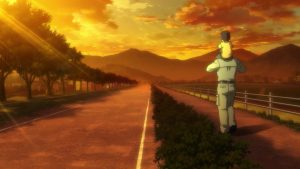
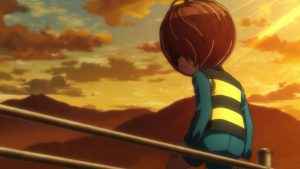
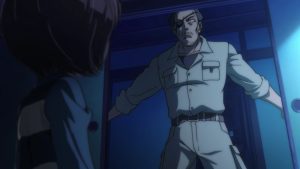

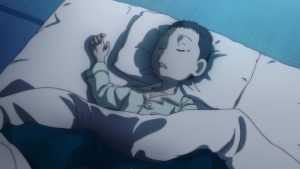

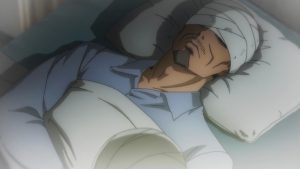
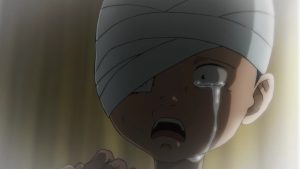

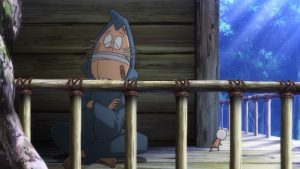
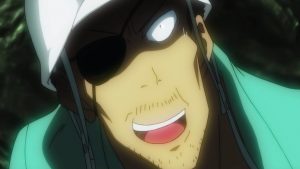
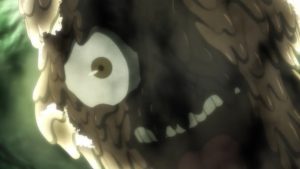
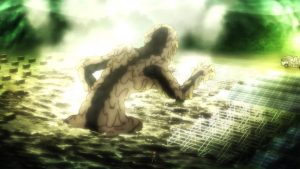


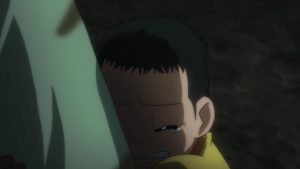

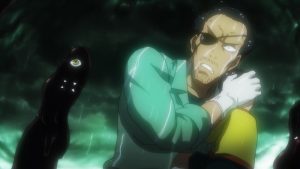

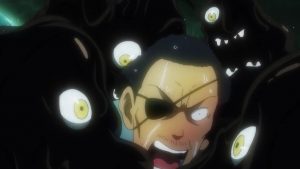
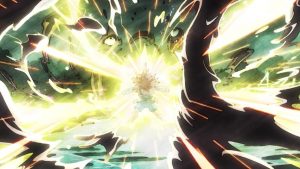

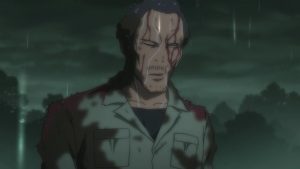
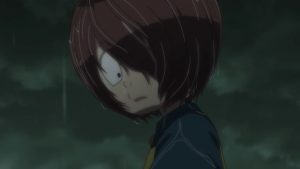
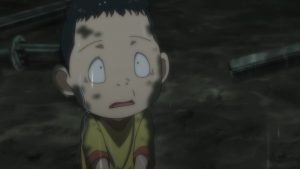
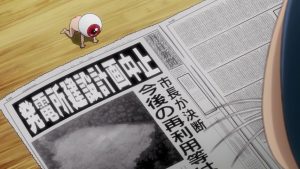
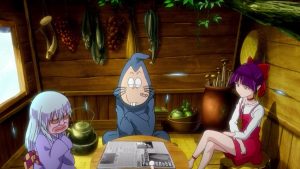
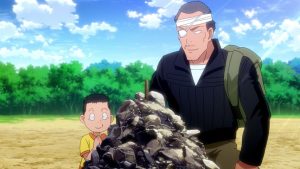
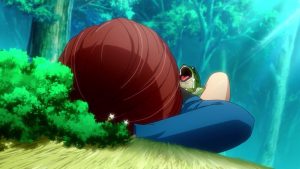

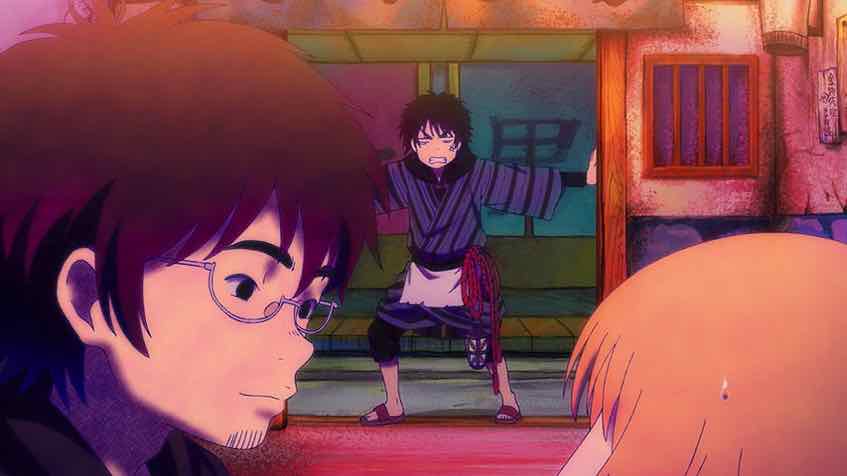
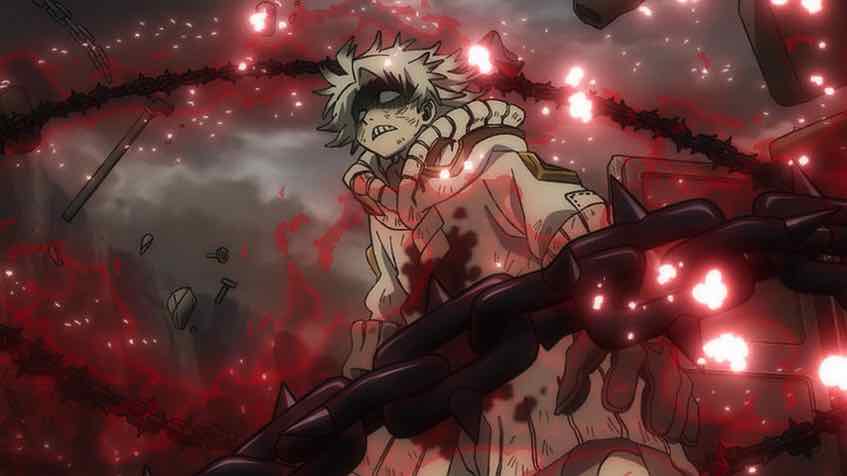
Proto
May 20, 2019 at 12:32 pm> I tend to think not, but I’m not so sure he would have “exploded” (that ability is unfamiliar to me)
That’s his internal electricity isn’t it?